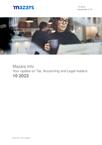
Mazars Info October 2023
EMPLOYMENT LAW
New regulation on incapacity for work during annual leave
As from January 1st 2024, an employee who becomes sick during his annual leave can ask to retain his holidays coinciding with the days of incapacity for work. Hereto, the employee will have to respect certain conditions:
- The employee must immediately inform his employer of his residence address if the employee is not available at his usual address.
- He must present a medical certificate to the employer, even if this is not required under the normal rules.
- No later than when he submits this medical certificate, the employee shall inform his employer that he wishes to exercise his right to retain his holidays coinciding with the days of incapacity for work from the end of the period of incapacity for work.
The employee is entitled to a guaranteed salary for the days of incapacity coinciding with the holidays.
Untaken vacation days are added back to the counters of annual vacation for the current vacation year and may be taken at a later time.
For more information on this topic, please contact our Labour law department.
Social elections: the reference period has ended
Every four years, social elections take place in Belgian companies. These elections are organized to appoint workers' representatives to the participatory bodies of the companies, in particular the Works Council (hereafter: "council") and the Committee for Prevention and Protection at Work (hereafter: "committee"). The next social elections will take place between
May 13 and 26, 2024.
A council must be established:
- In the enterprises that usually employ an average of at least 100 FTE’s.
- In the enterprises where a council was established or should have been established at the previous elections, insofar as they still usually employ an average of at least 50 FTE’s. In such a case, it is not necessary to proceed with the election of council members. Their mandate within the council will be exercised by the elected employee representatives of the committee.
A committee should be established in enterprises that usually employ an average of at least 50 FTE’s.
For the calculation of the threshold of 50 of 100 FTE’s, the calculation of the number of mandates, the eligibility conditions and the election conditions in particular, as well as for all rules of the election procedure, are considered as "employees": any person linked to the company by an employment or apprenticeship contract.
The calculation of the staffing is an average
To determine the headcount, all the employees referred to above are taken into account, even if their employment contract is suspended and they are absent, for example, due to illness or accident.
Social elections: the reference period has ended
The calculation of the employment threshold is based on a four-quarter reference period beginning on the first day of the sixth quarter preceding the quarter in which election day falls (specifically: for the 2024 social elections, the reference period began on October 1, 2022 to end on September 30, 2023).
The Labour law team has drafted two packages to guide our clients through this strict and complex procedure, in order to respect the calendar and the steps to be taken, to avoid potential errors and/or potential sanctions.
Our clients can count on our specialist guidance : either by (1) choosing the Assistance pack where we assist the client while they execute the procedure internally or, (2) by outsourcing the procedure where we take care of all obligations that the company must fulfil throughout the entire social election procedure.
For more information about this topic, please contact our Labour law department.
Confidential advisor mandatory as of 50 employees
The confidential advisor serves as a neutral point of contact that employees can turn to for a confidential conversation, as well as for advice, mediation, and possibly a referral. The confidential advisor's strict obligation of confidentiality strengthens its role. He is therefore a crucial link in preventing and combating psychosocial problems (work pressure, interpersonal conflicts, cross-border behaviour, etc.) in companies.
Today, the designation of a confidential advisor in a company is not mandatory except when requested by all staff representatives within the Committee for Prevention and Protection at Work (hereafter: ‘committee’).
A preliminary draft law now makes the designation of a confidential advisor mandatory in companies with at least 50 employees. For companies employing fewer than 50 employees, this obligation does not apply unless all members of the union delegation, or in the absence of a union delegation, all employees, request it.
In addition, at least one of the confidential advisors must belong to the staff of the company if it employs at least 50 employees. This also applies to the company that employs 20 or more employees and uses a prevention advisor from an external service for prevention and protection at work.
Finally, the preliminary draft law provides that if no confidential advisor has been appointed (a situation that may arise in companies with fewer than 50 employees), the prevention advisor of the internal service for prevention and protection at work may carry out his duties (except in companies with fewer than 20 employees where the function of prevention advisor is exercised by the employer and except in the event that the person concerned, or the committee does not agree).
This preliminary draft has yet to be published before being effective. Entry into force is scheduled for this fall.
For more information about this topic, please contact our Legal Labour law department.
VAT
Circular 2023/C/72 – The Belgian tax administration has published a new position on the cross-border provision of a company car to a staff member
Determining the place of taxation for VAT on certain cross-border supplies of a company car to a staff member has given rise to difficulties for a number of businesses.
On 1 September 2023, the Belgian VAT authorities issued the Circular letter 2023/C/72 updating the VAT treatment of company cars provided by foreign employers to employees living in Belgium.
With retroactive effect as from 1 July 2021, these cross-border supplies may be treated as the hiring of a means of transport for consideration, subject to certain conditions, with potential Belgian VAT implications for the foreign employers.
This circular letter clarifies the VAT obligations for foreign employers who provide company cars to personnel residing in Belgium. When a vehicle is provided for valuable consideration (for a period longer than 30 days), it's expected that Belgian VAT will be remitted. Foreign employers are expected to remit Belgian VAT on company cars provided for private use to employees residing in Belgium (for over 30 days), provided it's done for consideration.
As per the circular letter, in the following situations, it will be assumed that there is a supply against a " consideration":
i. Payment by the staff member to the company,
ii. Withholding of a portion of the remuneration by the company,
iii. Debiting from the current account of the company's manager, director, etc., up to the amount of the agreed remuneration, or
iv. A choice by the staff member between various benefits, offered by the company, where the right to use the company car implies the waiver of other benefits.
If these conditions are not met, the vehicle would, in principle, be considered as a self-supply subject to VAT in the employer’s Member State.
Our VAT specialists can provide assistance for the provision of a company car to employees in a cross-border context.
GLOBAL MOBILITY SERVICES
New regime for copyrights in Belgium : first decisions of the advance tax ruling commission
In our January 2023 newsletter, we announced that based on the law of 26 December 2022 (published on 30 Dec. 2022), Belgium adjusted its copyrights taxation regime as of 2023 (with a transition period until December 31, 2023).
This new regime has amongst others a more limited scope than before as the new copyrights taxation regime (briefly speaking) only applies to someone who is creating literary, scientific or artistic works.
In our previous newsletter, based on the above condition and after the Minister of Finances precisions, we highlighted that the copyrights tax regime will be very difficult to apply to computer programs design.
And effectively, the advance tax ruling commission recently confirmed (decision n° 2023.0659 of 3 October 2023) that the new copyrights regime is no more applicable for individuals developing new computer software as these creations are no more considered as creating literary, scientific or artistic works in the sense of the new law of 26 December 2022.
To conclude, as the tax ruling commission, the tax authorities and the Minister are now clearly following a restrictive interpretation of the legal text, we advise no longer to apply the new copyright regime to IT specialists. The company which decide to still apply the new regime to its IT specialists will certainly faces high risks of tax controls and retroactive corrections regarding this point.
CORPORATE INCOME TAX
New Income Tax Treaty Belgium-Netherlands (2023)
The Belgian and Dutch Finance ministers signed a new double tax treaty (“DTT”) between both nations on June 21, 2023, to replace the existing DTT as concluded in 2001 and modified by the 2009 protocol. The 2001 DTT has been notified as a covered tax agreement for the purpose of applying the MLI (Multilateral Instrument).
This new treaty will entail several changes compared to the 2001 DTT. This article deals with the main changes regarding withholding taxes (“WHT”) paid to Dutch companies on interest, dividends and royalties.
Withholding Taxes on Dividends – Article 10
The 2001 Belgium-Netherlands DTT, installed a reduced 5% WHT on the gross dividend amount, subject to the participation requirement (min. 10% shareholding) and according to the MLI, subject the permanence requirement (holding period of at least 365 days). In other cases, a 15% WHT rate applies.
The new 2023 DTT replaces the reduced 5% WHT rate by a full exemption in the new 2023 DTT, provided 3 cumulative conditions are fulfilled: the participation requirement, the permanence requirement and the beneficial ownership requirement (the recipient of the dividends is the actual beneficial owner of the dividend income).
In other cases, provided the beneficial ownership requirement is fulfilled, a 15% WHT rate remains applicable.
Withholding Taxes on Interest – Article 11
The 2001 Belgium-Netherlands DTT, installed a reduced 10% WHT rate of the gross interest amount. In some cases, a full WHT exemption applies.
The new 2023 DTT provides a full WHT exemption on interest payments, subject to the beneficial ownership requirement.
The WHT exemption under the EU Interest and Royalties Directive (2003/49/EC) is, unlike the DTT exemption, subject to the permanence and participation conditions, making the latter more beneficial.
Withholding Taxes on Royalties – Article 12
No changes installed by the new 2023 DTT.
Royalty payments are exempt from WHT provided the beneficial ownership requirement is fulfilled. No additional conditions should be considered.
Entry into force
The new DTT is still to be ratified by the parliaments of both nations. Following this ratification, the DTT can enter into force.
The new DTT applies for the income years starting on/after 1 January of the year that follows the year in which the DTT is ratified.
Our corporate income tax specialists can provide assistance on the applicable WHT treatment of your envisaged dividend, interest or royalty payment and other questions on the envisaged Treaty application.
KEEP IN MIND THE DEADLINE!
VAT
- VAT-return October 2023 : 20 November 2023
Corporate income tax
- Corporate income tax return AY 2023 (balance 31 March 2023) – Belgian resident companies and foreign entities: 31 October 2023 (Biztax e-filing platform)
Personal income tax
- Filing of the Belgian non-resident income tax return for income year 2022 (AY2023) (electronically via Tax-On-Web or on paper) : 24 November 2023



